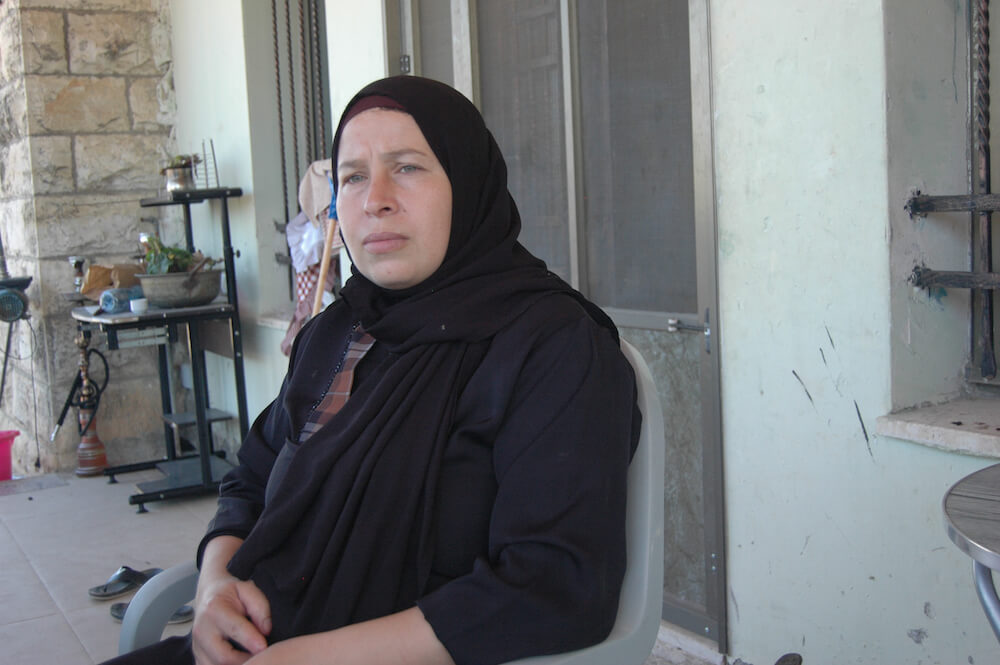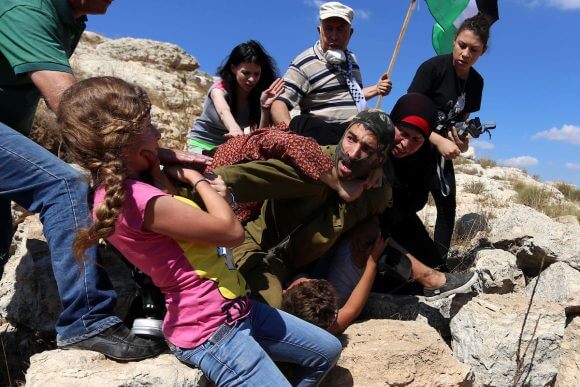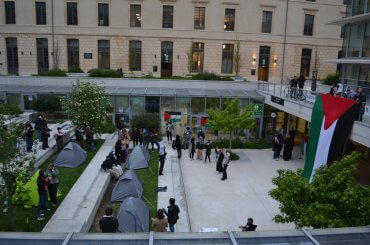Over the summer, one of the founding villages of the Palestinian non-violent movement, Nabi Saleh, decided to stop holding the weekly Friday demonstrations that brought the small West Bank town international attention. The move comes following scores of arrests and a general fatigue among protesters.
“It is very hard for the families to continue participating,” said Bassem Tamimi, a leader in Nabi Saleh who helped organize weekly marches over the past six years. The demonstrations are organized more or less in the backyards of the villagers. A combination of tear gas, rubber bullets, and live fire sprayed through the village on a weekly basis, which is different from other towns that stage marches in the far off agricultural lands.
“The tear gas is inside the village, the clashes are inside of the homes, and it’s a small village which makes it difficult for the people to continue,” said Bassem.
He estimates that more than 350 people from his 600 person town have been injured in clashes with the army since 2010, and 50 were left physically disabled. Two from Bassem’s family were killed by the Israeli military—Mustafa Tamimi and Rushdie Tamimi, the latter a police officer with the Palestinian force.
Bassem’s wife Nairiman has a surgically placed metal plate in her leg. It was implanted after she was shot in the knee last year by an Israeli soldier.
“Too many times to count,” Nairiman said, revealing scars from wounds inflicted by Israeli soldiers.

When the protests were first launched in 2010, most Friday mornings Bassem and Nairiman cooked an egg breakfast for at least 300 demonstrators. The ratio of participants was always and has remained around 3:1 Palestinians to Israeli and international activists. In those early years, the demonstration’s goal was to reach a natural spring taken over by settlers from Halamish. According to the Israeli human rights group Peace Now, 33 per cent of Halamish is built on land usurped from private owners in Nabi Saleh, with the watering hole in the count.
By 2013 the protests outgrew their small hamlet. The Tamimis caravanned to other villages around the West Bank. They shut down entrances to settlements, and a main highway that runs through the occupied Palestinian territory into Jerusalem, road 443.
The problems began last fall when a sizable group from the town were carted off to jail.
Lately, the numbers at the protests in town have dwindled. “The last one,” Bassem said referring to a march organized two months ago, “had around 30 Palestinians, and around 15 Israelis and internationals.”
“We found ourselves with just a few people who were participating after 22 [villagers] were arrested. But it’s not in Nabi Saleh only where the participation has declined. It’s everywhere,” Bassem said.
The relatives of the jailed found themselves in a sea of paperwork and court fines, Bassem included. His eldest son Waed was released in late August after being incarcerated for ten months for charges relating to protesting. Both Bassem and Nairiman have served time in Israeli prisons.

Bassem explained the math while seated on a sofa in his living room, Waed napping on another couch, “For example, I paid for Nariman my wife, the first [arrest fine] was $2,600 [10,000 NIS], the second time $1,300 [5,000 NIS], and another time $180 [700 NIS]. For me, I paid $3,200 [12,000 NIS] the first time, $1,300 [5,000 NIS] the second time. For my son I paid $400 [1,500 NIS] the first time, and the second time $500 [2,000 NIS].”
Actually, Bassem did not pay the last fine.
“I want to convince the people not to pay it, so I started with my son,” he said. Waed spent another two months in jail for refusing to post the bond.
Nabi Saleh was one of around eight West Bank villages that launched weekly Friday demonstrations and their protests received international recognition. Nairiman and the eldest Tamimi daughter Ahed, 15, traveled to Turkey to receive an award for outstanding activism after she was photographed tucking her arm back as if she were about to right hook a soldier. The image of a blond girl facing off with a grown man in full military garb perhaps best defines the mystique Nabi Saleh has built for itself.
The atmosphere in the village is widely regarded as somewhat unique. No other protest group included representational numbers of women and children. Bassem added, that because the town’s youth unabashedly threw stones at soldiers the army acted with more force.
Although Bassem considers stone throwing within his definition of non-violence, this view is not shared by the Israeli military. Police spokespeople generally refer to these actions as illegal and are called “disturbances” or “riots.”
“We don’t know what is the best decision,” Bassem lamented before cheerfully recounting Nabi Saleh’s successes. From the outset, his goal was never limited to only claiming back the land Israel expropriated for Halamish. His aims were higher: to subvert Israel’s occupation of the Palestinian territory by way of a mass movement of civil disobedience, with every sector of Palestinian society involved.
Bassem wanted a societal revolution of sorts, where villages across the countryside would protest in unison, starting with Nabi Saleh as a model.
That did not happen. But something else took a foothold.

“When we started in Nabi Saleh, we started after a decision. We are a group of leaders from the first intifada, and our goal was to convince our people and our society of the means of using non-violence,” he said.
“Our goal is the means,” he underscored, relating the importance he sees peaceful protests in contrast to the turbulent years of the second intifada in the early 2000s, “to make it familiar and acceptable, and for it to be the Palestinian strategy and the belief for dealing with the Palestinian issue in the future.”
Bassem had taken stock of the more than two decades of peace talks that did not lead to an agreement with Israel, and by 2004 he had joined protests with Israeli left-wing activists in other areas of the West Bank. They demonstrated against Israel’s separation wall. This, Bassem said, led to a sea change. He became a full-fledged “one-stater,” dropping faith in what he describes as the “losing” two-state solution to Palestinian sovereignty outlined by the West Bank’s ruling Fatah party, to which he is most aligned.
“We believe the negotiations [with Israel] will not lead to our rights, and the armed resistance, we can’t do it because it gives a cause for our enemy,” he said.
Bassem insists he has not given up on protesting, rather he plans to hold less frequent marches in order to build-up to a critical mass of dissidents, maybe monthly. “The general goal is to end the occupation,” he concluded.



One out of twelve (50 of 600) villagers have sustained disabling injuries as a result of their years of weekly nonviolent actions. Resistance to oppression takes a toll.
I have a lot of admiration for the Tamimi family. They’ve endured so many personal losses. Their smiles and strength is the real light to the nations.
The usual terrorism of settler colonialism.
Qucik Bibi, talik about Palestinian rockets, knives or Islamic terrorism in general.
Poor Zio-supremacists. It seems that no matter what they do, whether its…
– committing acts of terrorism;
– ethnically cleansing the indigenous population from their homes and lands;
– establishing an oppressive and religion-supremacist state;
– maintaining and expanding their supremacist state by means of military occupation and colonialism;
– deliberately flouting international laws and refusing to honour their obligations under them,
…or simply crushing peaceful protests and maiming civilians, they’re demonized as the “bad guys”.
Aggressor-victimhood sure is a tough gig… :-(
I kind of wish people like tamimi started leading a movement for equal rights for palestinians. The struggle for a palestinian state is unfortunately all but over. A combination of increased israeli brutality, tacit support by a US largely captured by zionist visions which obscure the colonialist nature of the israel project, and a steadily rising campaign against international activists, have all contributed to the realization that palestine cannot be as envisioned.
Sometimes, i think left wing activists get so sold on their own somewhat idealistic visions that they neglect to see the reality, in all its gore. The reality is that power and money (the two being interdependent) play a big role in human events and always did. Revolution is a nice word, but when these only work when the numbers are there. The sanders revolution in the US failed, so what hope does a palestinian revolution have?
Ultimately, the palestinians of the west bank may need to take a step back, save themselves from death and injury, so they can fight another day. And when that day comes they will have to overcome their own differences and join the palestinian israelis (even if there’s a barrier in between) and call for their rights within the israeli system, crooked as it is.
Somehow the struggle of the palestinians for a state of their own reminds me of the Spanish civil war. We know who won and who lost in that one. Those who saw echoes of Algier in palestine were misguided in equating the french with Israelis, and also ignoring the fact that a sea separated Algeria from france. Geography is destiny, they say, and in this case, it unfortunately is.